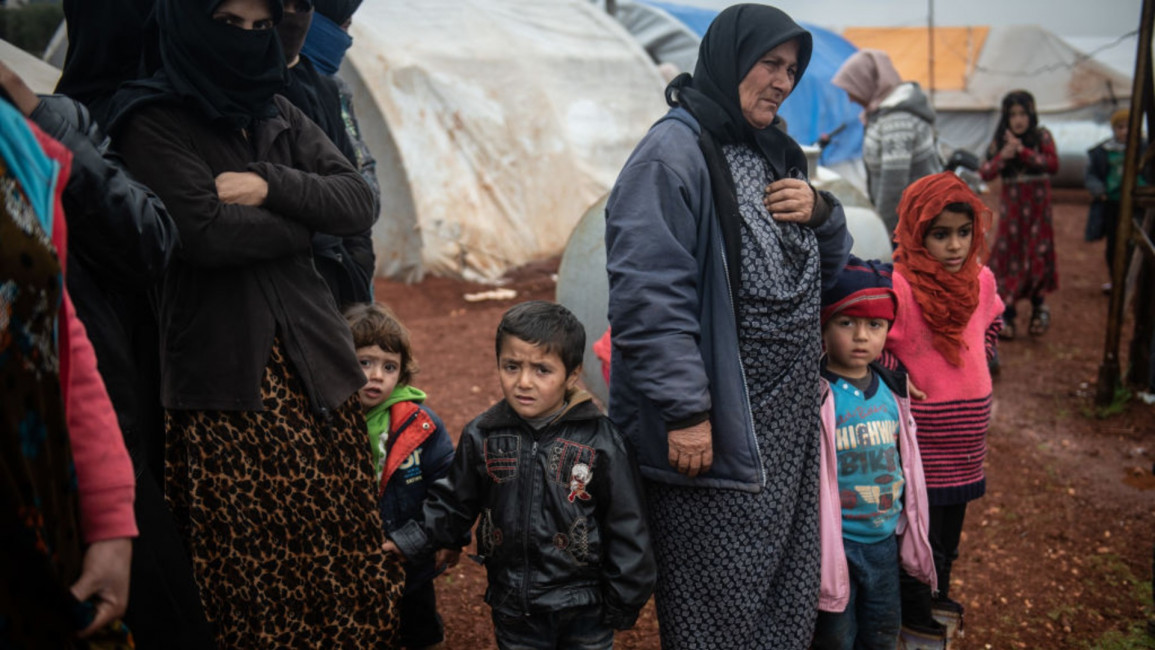
Russia is abusing its UN veto power to snuff out Syrians' final lifeline
And, what's more, this has occurred through the processes of the UN itself.
There's no other way to look at Russia and China's veto of a UN Security Council Resolution that would have extended authorisation of cross border aid into Idlib for a year. The mechanism currently allowing delivery of this aid expires this week.
The resolution was drafted by Germany and Belgium, two non-permanent members of the Security Council, but was swiftly and predictably discarded by the veto-wielding Russia and China, both of which have vested interests in the triumph of Assad in Syria.
The fact that Assad's rule has spearheaded an array of war crimes amounting to genocide is well understood by the international community, but the victims of Assad cannot rely on support comparable to that which the tyrant receives from Russia - either on the military or diplomatic level.
Of the original four aid lifelines from Turkey into Northwest Syria, Russia's soft power offensive had already managed to reduce this to two, but it was only a matter of time before they moved to snuff them out entirely.
It was under Russian pressure that the UN aid hubs from Iraq into Northeast Syria at Al-Yarubiya and the southern Jordanian one at al-Ramtha were discontinued, while cutting the year-long mandate for reauthorisation to six months. In May, Russia's Ambassador to the UN Vassily Nebenzia, plainly advised other members of the Security Council to "not waste their time" in trying to reopen the already closed crossings.
 |
What meaning do such resolutions have if they can be so swiftly struck down by Russia and China? |  |
China and Russian apologists claim that the centralisation of aid through Damascus is merely a necessary reaction to increased sanctions on Assad and his backers. But Russia, bolstered by China, has been incrementally chipping away at the veracity of the cross-border aid mechanism that had been established by a UN Resolution in 2014.
Given Russia's overt and aggressive intransigence, this most recent veto very likely represents the final nail in the coffin of autonomous aid routes into liberated areas of Syria.
And while the sinister long-term agenda that motivates Russia in this respect must not be forgotten - namely the desire for Assad to reconquer all of Syria by any and all means - the immediate effects of this could be catastrophic.
For millions of Syrians in Idlib, this aid is quite literally the difference between eating and starving. For this population of mostly internally cleansed refugees, already ravaged not just by the direct effects of war but also by disease and squalor, ending this aid could be the difference between life and death.
Twitter Post
|
Idlib's hospitals and medical facilities, at least those not destroyed or weakened by Assad and Russia's criminal bombing campaigns, rely on such aid for often life-saving medicines and equipment. The entire population of Syria, bombarded by war, sanctions, internal and regional corruption, Covid-19 and a regional and global economic meltdown, was already at risk of what many consider to be an inevitable famine.
Within this grim ocean of precarity, the assaulted Northwest was always going to be among most precarious areas of Syria. The one lifeline it had has now been snuffed out. In the words of Human Rights Watch's Louis Charbonneau, it could very well mean a "virtual death sentence for many Syrians".
Read more: Amnesty slams Russia and China's 'despicable' Syria aid veto
Of course, this has been one of the most effective weapons in Assad-Iran-Russia's arsenal over the course of the nine-year-long civil war, with the regime simultaneously selectively distributing aid to loyalists and using it as the basis to enrich corrupt pro-regime kleptocrats, while weaponizing it as a means to deliberately starve Syrian civilians in liberated areas.
In Northeast Syria, following the closure of Yarubiya, Assad distributed aid selectively to regime-controlled hospitals, while medical facilities serving the populations living under de facto PYD-controlled areas receive nothing. The idea that Assad could or would distribute aid to any force comprising the much-despised opposition in Idlib is absurd.
But the UN and wider international community here too must take some responsibility. It's all well to draft resolutions for life-saving aid to millions of people, but what meaning do such resolutions have if they can be so swiftly struck down by Russia and China, with nothing more than condemnatory rhetoric from UN bodies and other members of the Security Council?
This question is not abstract. Given the current global and regional situation, the UN and individual donor countries could attempt to affix conditions on the aid that must go through Damascus, such as the streamlining of its deliberately byzantine, expensive, time-consuming process for registering international humanitarian NGOs looking to work in the country.
Or they could demand that a necessary portion of aid that goes through Damascus must be dispersed to non-regime controlled areas.
The UN could easily state that it would withhold all aid if these conditions aren't met. And with the Assad regime facing economic catastrophe and Russia unable to help, Damascus' monopoly on aid is vital to the interests of both. It's highly likely then, that Russia would withhold its veto of the extension of the cross-border humanitarian lifelines, if this action was taken by the UN.
But the UN hasn't even hinted at such an obvious manoeuvre. Instead, it submits to and appeases Russia, allowing UN funds to be appropriated by a regime that it has accused of war crimes now on multiple occasions.
The fact that Assad has repurposed billions of dollars in UN humanitarian aid to disperse to regime loyalists affected by sanctions or subsidise his war effort, has been well documented for years.
 |
The UN submits to and appeases Russia, allowing UN funds to be appropriated by a regime that it has accused of war crimes now on multiple occasions |  |
Yet nothing has been done about it. Add into the mix Russia using the Security Council to essentially exacerbate the stranglehold Assad has over humanitarian supplies and you have the UN, by sheer dysfunction and a clear breakdown of its mechanisms, potentially aiding in genocide.
This opens up the question of why Assad and Russia even have this opportunity handed to them on a plate by the UN? Russia is openly exploiting its privileges as a permanent member of the Security Council to better wage war on Syrians living outside regime control, so why then is the fate of such Syrians so easily surrendered to those who wish to annihilate them?
It has been clear for some time that concerning Syria the UN is effectively useless if there isn't a consensus among the Security Council.
When no such consensus exists, and it's clear that member states are exploiting their veto powers for the purposes of aiding and abetting war crimes or crimes against humanity, action must be taken by the UN to ensure this cannot be allowed to happen with only rhetorical condemnation.
This, again, is not some abstract question of 'policy'. Millions of Syrian lives depend on something being done.
Sam Hamad is an independent Scottish-Egyptian activist and writer.
Join the conversation @The_NewArab
Opinions expressed in this article remain those of the author and do not necessarily represent those of The New Arab, its editorial board or staff.


![Minnesota Tim Walz is working to court Muslim voters. [Getty]](/sites/default/files/styles/image_684x385/public/2169747529.jpeg?h=a5f2f23a&itok=b63Wif2V)




